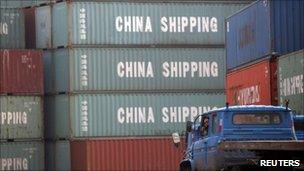Doha Round: US presses China, India and Brazil
- Published

The US says China's growth has changed the trade landscape
The Doha round of trade talks will have no relevance to the modern world unless big emerging economies open up their markets, US officials have warned.
Nations such as China, India and Brazil needed to accept "their expanded roles in the global economy", said the office of the US Trade Representative (USTR).
The Doha Round was launched in 2001 to boost the world economy and stimulate growth through trade.
But the talks have been stalled since 2008 over agriculture imports.
In January, a report by a group of trade experts said the round had to be completed by the end of this year if it was to be a success.
Changing landscape
The USTR's comments came in an annual report outlining President Barack Obama's trade agenda.
It said the "remarkable growth" of China, India and Brazil had "fundamentally changed the landscape".
"The global rules for trade need updating to reflect the rise of the emerging economic powers," it added.
It said that in order for the Doha talks to "remain relevant", they had to address "the world as it is and as it will be in the coming decades".
The USTR pointed out that the US was being asked for significant tariff cuts on all industrial and agricultural goods and asked emerging economies to "accept responsibility commensurate with their expanded roles in the global economy".
It added: "The linchpin to Doha Round success will remain securing meaningful market access commitments in agriculture and other areas, particularly from key advanced developing countries that have been the fastest-growing economies."
Aid squeeze
In another development, US Secretary of State Hillary Clinton said plans to reopen a US development aid office in the Pacific region were under threat because of budget cuts.
USAID has not had a presence in the region since 2006, when its office in Fiji was closed down.
Mrs Clinton told the House of Representatives Committee on Foreign Relations that the decision put the US at a disadvantage in competing with China, which was spending "enormous amounts of money" in the region.
- Published28 January 2011